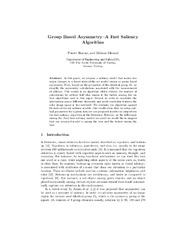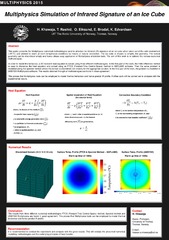Blar i forfatter "Eiksund, Oddmar"
-
Comparing optimization schemes for solving case studies with multiple heat exchangers using high-order pinch point temperature difference methods
Brodal, Eivind; Jackson, Steven Richard; Eiksund, Oddmar (Journal article; Tidsskriftartikkel; Peer reviewed, 2023-10-21)Heat exchangers (HEs) are often modeled using pinch point temperature difference (ΔT<sub>pinch</sub>) methods when optimizing systems with HEs. However, even small inaccuracies in model predictions of HEs will introduce numerical noise that can cause optimization algorithms to fail. A recent study of single HEs suggests that highorder interpolation methods can compute ΔT<sub>pinch</sub> much faster ... -
Group Based Asymmetry – A Fast Saliency Algorithm
Sharma, Puneet; Eiksund, Oddmar (Chapter; Bokkapittel, 2015-12-18)In this paper, we propose a saliency model that makes two major changes in a latest state-of-the-art model known as group based asymmetry. First, based on the properties of the dihedral group D4 we simplify the asymmetry calculations associated with the measurement of saliency. This results is an algorithm which reduces the number of calculations by at-least half that makes it the fastest among the ... -
Multiphysics Simulation of Infrared Signature of an Ice Cube
Khawaja, Hassan Abbas; Rashid, Taimur; Eiksund, Oddmar; Broadal, Eivind; Edvardsen, Kåre (Journal article; Tidsskriftartikkel; Peer reviewed, 2016-08-29)This paper presents numerical methodologies to simulate the Infrared (IR) signature of an ice cube. The ice was frozen in a cold environment (-28<sup>o</sup>C) and allowed to have uniform temperature throughout. It was then taken out and let to warm at room temperature conditions by means of natural convection. A 3D transient heat equation is solved using three different methodologies. In the first ... -
Multiphysics Simulation of Infrared Signature of an Ice Cube
Khawaja, Hassan Abbas; Rashid, Taimur; Eiksund, Oddmar; Brodal, Eivind; Edvardsen, Kåre (Conference object; Konferansebidrag, 2015-12-11)This poster presents the Multiphysics numerical methodologies used to simulate the Infrared (IR) signature of an ice cube when taken out of the cold environment (-28 C) and allowed to warm at room temperature conditions by means of natural convection. The ice cube is chosen to simplify the geometry. The cubical geometry can be discretized simply and hence allows easy application of Multiphysics ... -
Optimization of Pure-Component LNG Cascade Processes with Heat Integration
Eiksund, Oddmar; Brodal, Eivind; Jackson, Steven (Journal article; Tidsskriftartikkel, 2018-01-15)Liquefaction of natural gas is an energy-intensive process in which the energy efficiency depends on the number of compressors stages and the heat integration scheme. The aim of the study is to systematically evaluate process performance of pure component cascade processes, present optimized designs for all relevant numbers of compression stages and compare energy consumption between processes with ... -
Optimization study of heat pumps using refrigerant blends – Ejector versus expansion valve systems
Brodal, Eivind; Eiksund, Oddmar (Journal article; Tidsskriftartikkel; Peer reviewed, 2019-11-19)This article investigates tap water heating systems to highlight an ongoing debate. Some report that CO2-based transcritical heat pumps with an ejector have the best coefficient of performance (COP), while others report that blend-based refrigerant systems (without an ejector) are better. In the literature, however, these systems are only compared with conventional heat pump designs, and not against ... -
Performance and Design Study of Optimized LNG Mixed Fluid Cascade Processes
Brodal, Eivind; Jackson, Steven; Eiksund, Oddmar (Journal article; Tidsskriftartikkel; Peer reviewed, 2019-09-26)Mixed Fluid Cascade (MFC) processes are often claimed to be one of the most efficient methods to liquefy natural gas. Their performance depends on both operating conditions such as ambient temperature, and system design parameters such as exchanger sizes. The performance of the standard MFC process can be further improved by modifying the design with additional equipment, such as liquid refrigerant ... -
Transient Model of an RSW System with CO2 Refrigeration – A Study of Overall Performance
Brodal, Eivind; Jackson, Steven; Eiksund, Oddmar (Journal article; Peer reviewed; Tidsskriftartikkel, 2017-11-07)Refrigerated seawater (RSW) cooling using CO2 based refrigeration is a relatively new technology that shows promising performance in cold climates. For being a refrigerant CO2 has a low global warming potential (GWP) and is therefore recognized as an environmentally friendly alternative if the unit is competitive on energy efficiency. However, RSW systems with CO2 have a significant reduction in ...


 English
English norsk
norsk






